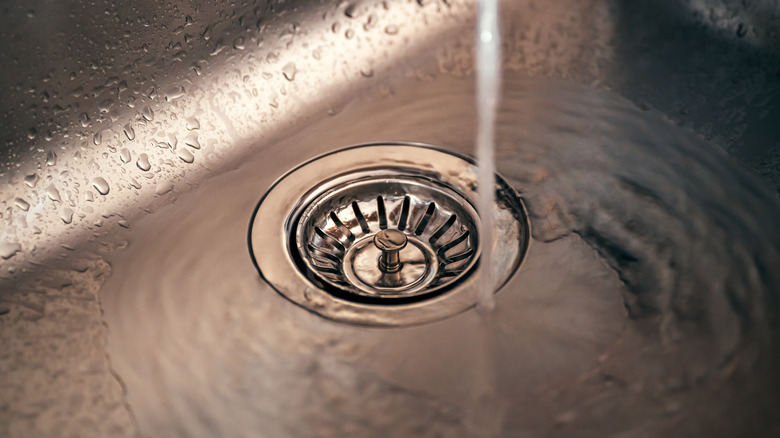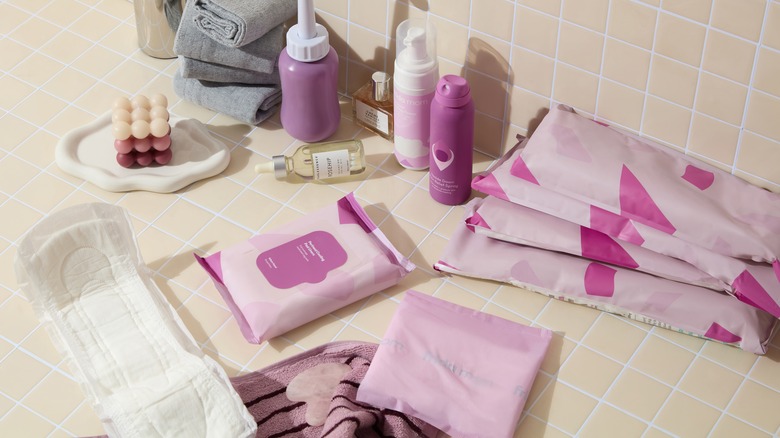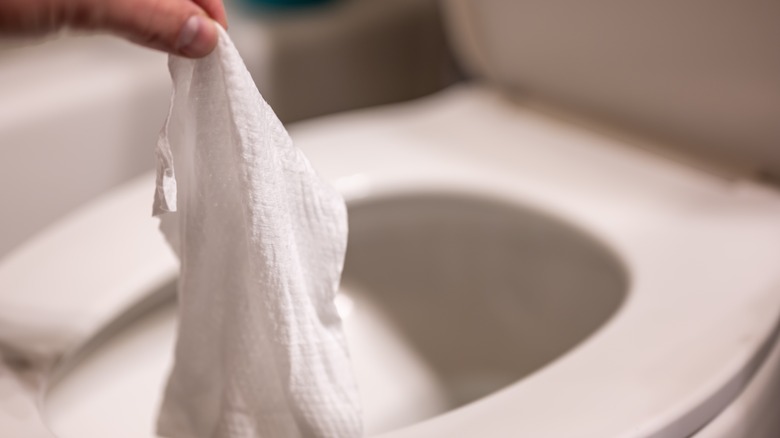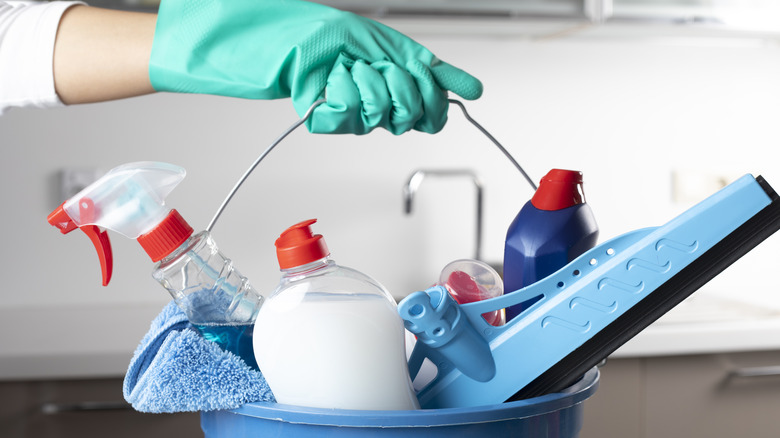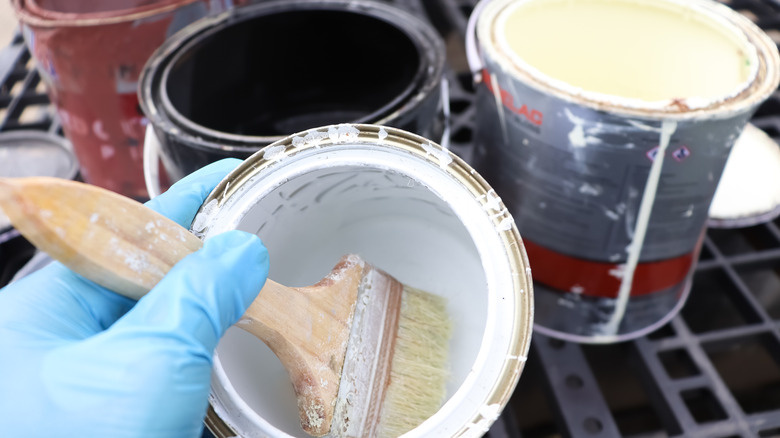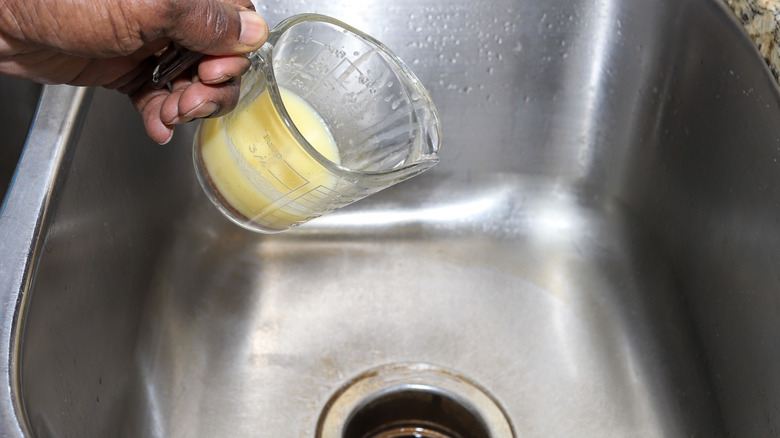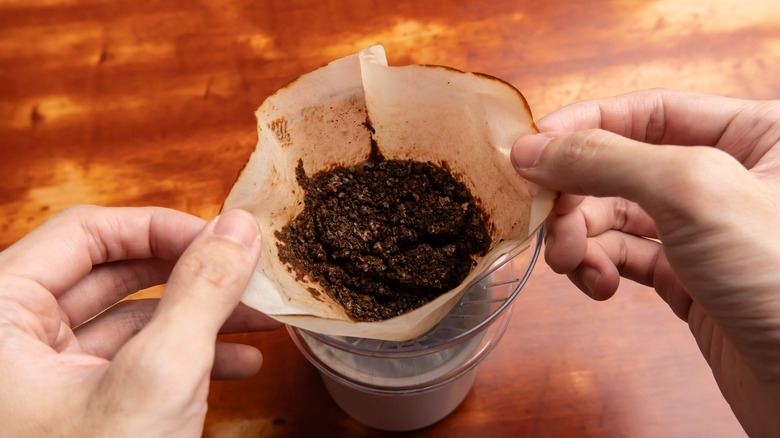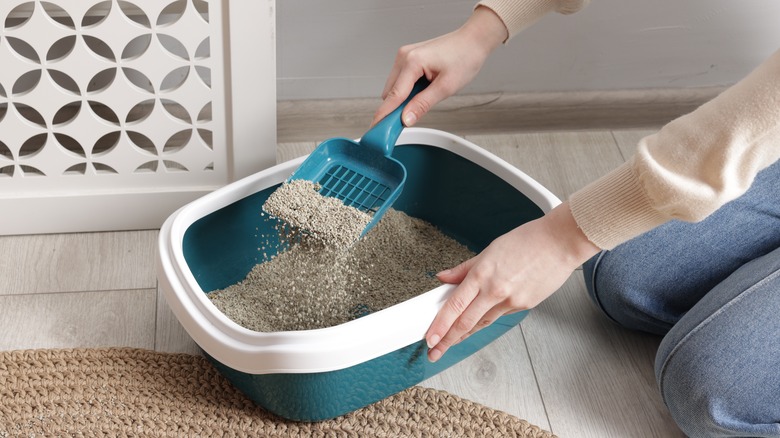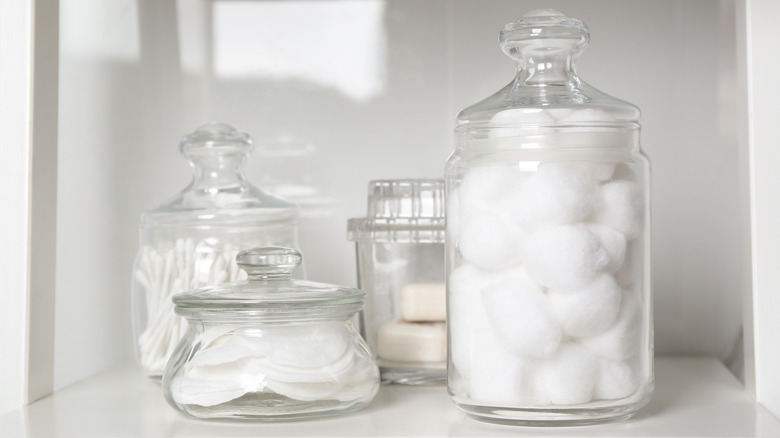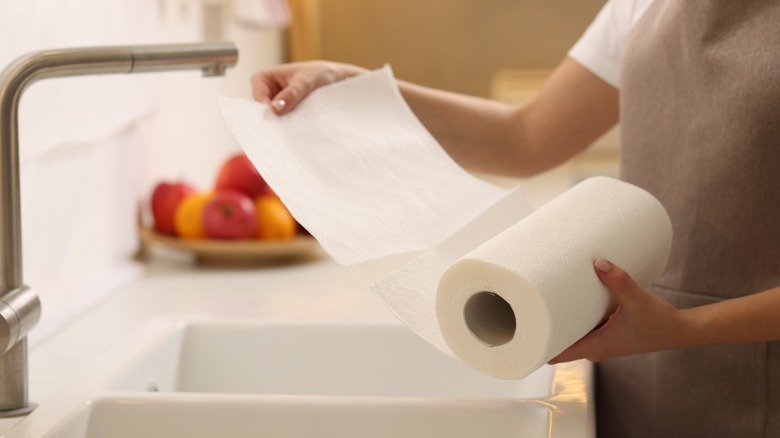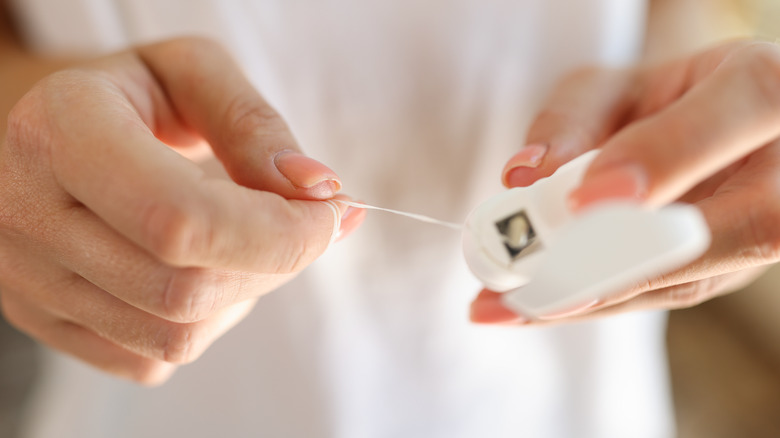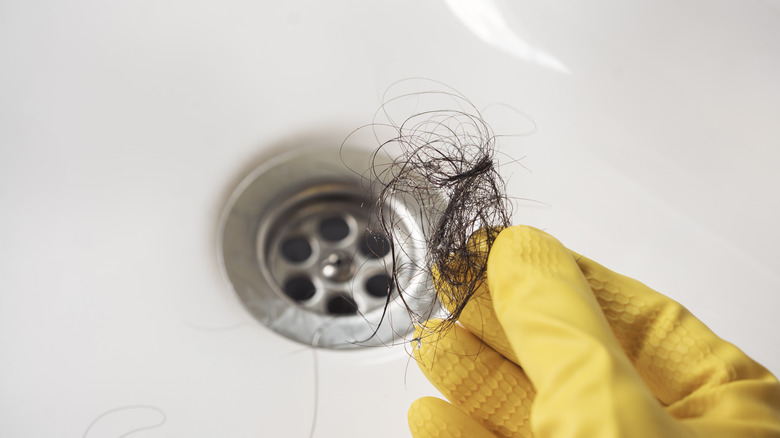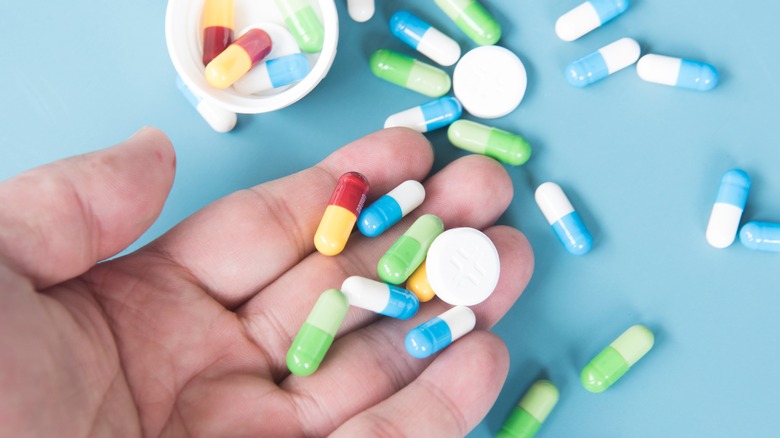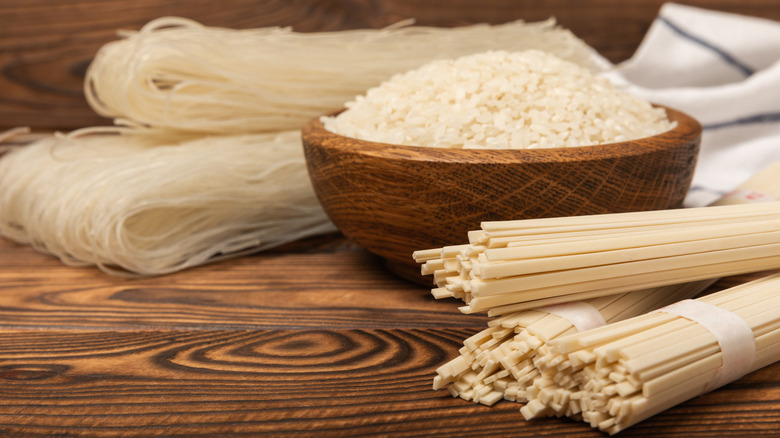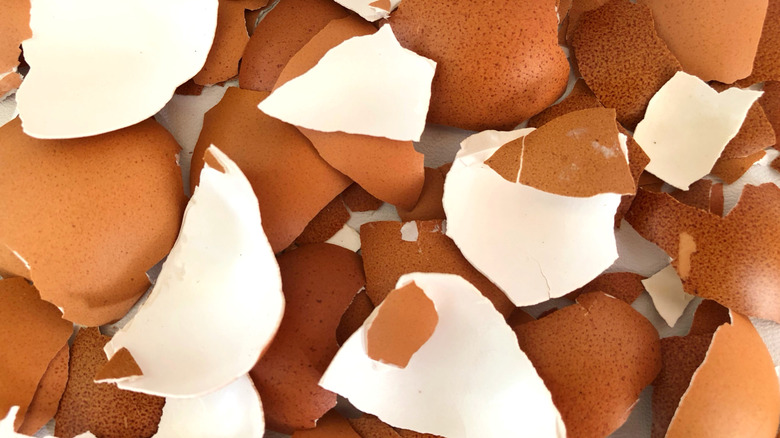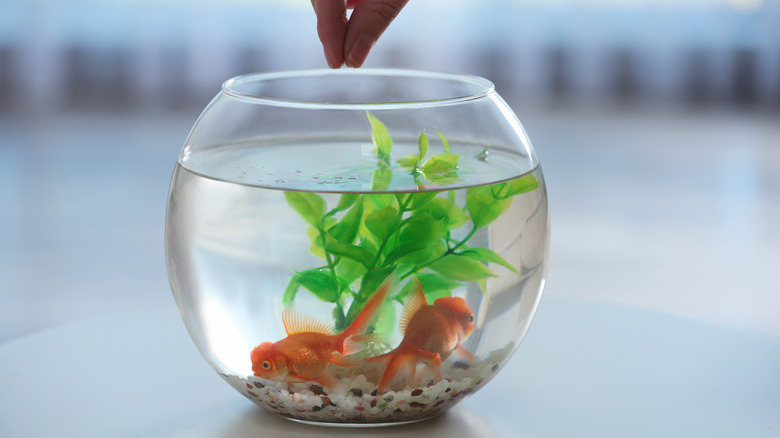15 Things That Could Ruin Your Plumbing If You Dump Them Down The Drain
Household plumbing is a delicate and intricate system that provides clean water and disposes of dirty water throughout a home. As such, it's important to keep pipes and drains well-maintained and free of clogs and damage. After all, it's a homeowner's nightmare to discover a leaking or clogged pipe or a malfunctioning drain in their house — plumbing repairs are not on the cheaper end of the cost scale. On average, hiring a plumber to inspect and fix damage can cost anywhere from $45 to $200 an hour. To avoid spending an exorbitant amount of money on plumbing repairs and issues, it's best to avoid any practices that could gradually or outright destroy your home's plumbing. Among the more common plumbing mistakes that can cause more damage and ultimately ruin your plumbing is dumping things in the drain that aren't meant to be flushed down them.
A simple clog might seem like an easy, DIY fix, but ultimately, the small items that homeowners think they can just flush down a toilet or send down a garbage disposal can harm the plumbing in your house in more costly ways. While it might seem like an easy solution to simply avoid sending obvious drain-clogging items down your water pipes, the list of things that should most definitely not meet a watery demise is more extensive than homeowners might initially think. Here are the things that are an absolute no-go for dumping down your drains.
Personal hygiene products
As nearly every public restroom you've ever visited might have already warned you, feminine hygiene items should be placed in garbage bins instead of flushed down toilets. Composed primarily of cotton, menstrual products are designed to absorb liquid and moisture, which causes them to expand. The expanded cotton can cause blockages in your drains if flushed, and ultimately lead to bigger toilet clogs that professionals will have to fix. Tampons, specifically, should be disposed of in the trash since they're made of both expanding cotton and plastic applicators, which do not break down in water either.
Items marked as flushable
Despite being advertised as "flushable," most flushable products are not actually meant to be flushed. Among the common items marketed as flush-safe are wipes. Body wipes, hand wipes, and cleaning wipes should all be placed in the trash bin after use instead of being flushed down the toilet, as they contain numerous microplastics. These microplastics and other chemicals are not biodegradable, nor are they good for the environment. The accumulation of wipes can wreak havoc by causing clogs in your personal plumbing system and can eventually make their way into wastewater treatment facilities, blocking their water pumps and causing sewage overflows.
Household cleaners and drain uncloggers
Not all liquids are meant to be poured down drains or flushed down toilets — even liquids that are intended to clean and sanitize drains and toilets. Most household cleaners and products that are designed to quickly unclog your drains contain a lot of chemicals that not only harm the environment but are also abrasive and corrosive. Drain uncloggers, especially, contain corrosive chemicals that are meant to break down clogs; however, in doing so, they can also erode your pipes and damage your septic system. Instead, opt to use natural cleaning ingredients like baking soda and vinegar to unclog and clean your plumbing.
Paint
It's a common mistake for DIYers or artists to wash paintbrushes in sinks after finishing a project or art piece. Once these paints are dumped into your drains, they can cause buildup in your pipes, leading to blockages and clogs. Whatever does make it through your septic system and back into the ecosystem can ultimately contaminate and poison groundwater supplies. Since there is a wide variety of paint types, there are also plenty of chemicals that exist within the medium. Instead, take remnant paint to a proper disposal site or let it dry overnight and toss it with regular trash.
Cooking grease or oil
After cooking, you may be tempted to dump the excess oil or cooking grease down the drain to dispose of it. While it may seemingly make cleanup easier, the long-term effects of oil accumulating in your pipes can damage your kitchen drains. When warm, oil and grease maintain a fluid consistency; however, once cooled, they solidify. The solid clumps of grease can obstruct your drains by just existing or by causing other food waste to stick to them, obstructing your pipes. Instead, pour leftover oil or grease into a bottle for reuse or let it solidify in a plastic container before disposing of it in a garbage bin.
Coffee grounds
A cup of joe in the morning can kickstart your day, but to keep your plumbing system running smoothly, discard used coffee grounds in the garbage bin or try some unexpected uses for leftover coffee grounds in your home. Repurposing or properly throwing away coffee grounds in a compost or trash bin can prevent clogs from forming in your kitchen sink or garbage disposal. Coffee grounds stick together, forming a sludge-like mass when wet. This mass can solidify and cause a build-up in your kitchen sink's pipes, preventing them from functioning and draining properly.
Cat litter
If human waste can seamlessly go down a toilet, why can't a cat's? While it is generally okay to flush your cat's number twos down the toilet, it's not recommended to dispose of their clumped waste or their litter in your bathroom plumbing system. Made of materials like clay, silica, or gel, kitty litter is meant to clump together when wet, allowing easier disposal of their liquid waste. Its clumping properties make it unsuitable for flushing, as it will congeal and cause blockages in your septic system. Like other chemically laced items, cat litter can eventually contaminate and poison water ecosystems once flushed.
Cotton balls, swabs, and other cotton-comprised products
As aforementioned, cotton balls, swabs, and other cotton-comprised products expand when exposed to moisture. Cotton is also meant to absorb and retain water, not break down in it. If flushed or disposed of in a pipe, it will expand and cause an obstruction within your plumbing system that can ultimately require the help of a professional plumber to extract and eliminate. To properly dispose of cotton-composed items, simply place them in your regular garbage bin.
Most paper products aside from toilet paper
When deciding on what can or can't be flushed down the toilet, keep in mind the three P's — pee, poop, and toilet paper. Any other paper products, including but not limited to facial tissues, wipes, paper towels, and personal hygiene items, should be thrown away into a trash can. Toilet paper is the only exception since it is specifically made to disintegrate and break down quickly, reducing the risk of clogging your toilet and septic system. Even though toilet paper is meant to decompose at a rapid rate, be mindful of the amount you use and flush down your porcelain throne.
Dental floss
The tooth cleaning tool is great at getting at anything caught between your teeth, but it should not be caught in your drains or plumbing. After performing your daily floss ritual, throw away used floss in the trash, not the sink or toilet. The waxy coating on floss, as well as the plastic threading that it's composed of, does not decompose easily. As they are essentially waxy strings, floss can get caught in drains. They can tangle together in your drainage pipes, forming a web that can trap other debris to further block your drains.
Hair
Like dental floss, hair does not decompose easily. Even though hair is a natural thing, it does take a while to break down completely. Instead of letting loosened or fallen hair make its way down your shower drain, invest in a hair catcher. A hair catcher for your drain will prevent the hair from entering and building up in your shower drain, which can lead to blockages and clogs. If an abundance of hair does make it down your drain, try unclogging it with baking soda and vinegar or use a shower snake to extricate the hair.
Medicine
Medicine should never be dumped down a toilet or a drain. Flushing medicine down your toilet can not just damage your septic system, but it can also pose problems at wastewater treatment plants. As they are not typically prepared to treat water inadvertently laced with various medicines, water supplies can become contaminated with toxic chemicals once the medication eventually breaks down. If no longer needed, medicine — in both liquid and pill form — should be properly disposed of at a facility. Medication disposal facilities can be found at pharmacies, police stations, and hospitals.
Fibrous or starch-filled foods
Stringy, fibrous foods like celery, legumes, and artichokes should not be sent down a garbage disposal or drain. The stringy texture of these types of food prevents them from getting sufficiently shredded in a regular disposal, ultimately causing them to clump together and clog your drain. Likewise, starch-filled foods like noodles, rice, bread, and potatoes should also steer clear of the garbage disposal. These foods expand when wet, which can cause obstructions in your pipes. The remnants of the starchy food can also wad together to create a thick paste that can trap debris and build up and clog your pipes, too.
Eggshells
As fragile as eggshells may be, they can still pose quite a threat to your plumbing if they're sent down your drain or garbage disposal. Like many of the previous items listed, eggshells can also cause blockages in your drains and pipes, leading to inefficient water flow. The small pieces of eggshell can accumulate and build up within your plumbing. Since they are also slow decomposers, they can sit in your septic system after going through your drains, which can eventually require more maintenance visits. Properly dispose of eggshells by composting or putting them in the garbage.
Pet fish
Despite popular belief, it is not actually okay to send your beloved fish to a watery grave. Doing so can cause blockages in your toilet pipes or your drains. A fish can also damage your septic system, since the intricate water treatment system is only designed to clean human waste and toilet paper. If the fish is deceased, it can decompose, further contaminating the water supply. If alive, a fish may have the potential to infest water habitats after swimming through pipes to find a new home. Instead, give your pet a proper burial in your yard or rehome it if it's still swimming.
